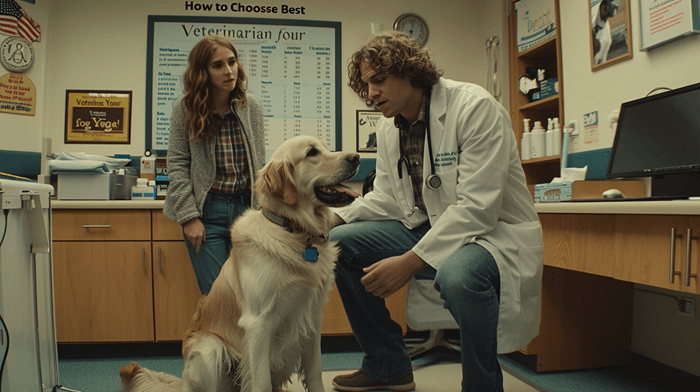
Choosing the right veterinarian for your dog is not just an essential task; it is one of the most significant decisions you will make as a pet owner. Your dog’s health and well-being depend heavily on the quality of care they receive. Just as you would not entrust your health to just anyone, the same principle applies to your furry friend. Finding a veterinarian who understands your dog’s specific needs, communicates effectively, and provides comprehensive care can make a world of difference in your pet’s life.
This article delves deeply into the criteria for selecting a veterinarian that aligns with your dog’s requirements, providing detailed insights and practical advice. From understanding the benefits of quality veterinary care to common pitfalls to avoid, we’ll equip you with the knowledge to make an informed decision. By the end of this guide, you will have a clear roadmap for choosing a veterinarian who will be a trusted partner in your dog’s healthcare journey.
Why Choosing the Right Veterinarian Matters
Selecting the best veterinarian isn’t merely about finding someone who can administer vaccinations. It’s about establishing a long-term relationship that can profoundly impact your pet’s health over the years. Here are five compelling reasons why this choice is crucial:
1. Comprehensive Health Care

A qualified veterinarian offers comprehensive care encompassing preventive health measures, diagnostic tests, surgeries, and emergency care. This holistic approach ensures your dog receives consistent monitoring, timely interventions, and proper health management tailored to their unique needs.
Importance of Preventive Care
Preventive care includes vaccinations, regular check-ups, and screenings for common conditions. These measures can identify health issues early, often leading to more effective treatments and better outcomes. For instance, heartworm disease, which can be deadly, is easily preventable with proper veterinary guidance.
2. Trust and Communication

Your relationship with your veterinarian should be built on trust and open communication. A good vet will take the time to explain your dog’s health conditions, answer your questions, and involve you in the decision-making process regarding your pet’s care. This relationship fosters a sense of partnership and reassurance.
Importance of Communication
A veterinarian who communicates effectively will discuss treatment options in detail, ensuring you understand the potential benefits and risks. They should encourage you to ask questions and express any concerns you may have about your dog’s health.
3. Specialized Services

Some dogs may require specialized care due to pre-existing conditions, age, or breed. Choosing a veterinarian with access to specialized services, such as dermatology, dental care, or oncology, can be invaluable. It ensures that your dog receives the best possible care tailored to their specific needs.
Understanding Your Dog’s Needs
Certain breeds may have predispositions to specific health issues. For example, large breeds like Great Danes often face orthopedic problems, while smaller breeds may be prone to dental issues. A veterinarian familiar with these breed-specific conditions can offer tailored advice and treatment options.
4. Emergency Care Availability

Accidents and health crises can occur at any time. A veterinarian who offers emergency care services or is affiliated with a nearby emergency clinic can provide peace of mind. You want to ensure that you have quick access to care in urgent situations, which could be life-saving for your dog.
24/7 Access to Care
Some veterinary practices offer 24/7 emergency services, while others partner with local emergency clinics. Knowing that you have reliable emergency care can alleviate anxiety and ensure your pet receives immediate attention when needed.
5. Support for Pet Owners

A compassionate veterinarian understands that being a pet owner can be emotionally challenging. They should provide support and resources to help you navigate your pet’s health journey, including nutrition advice, behavioral guidance, and palliative care when necessary.
The Role of Pet Owner Education
Your veterinarian should not only treat your dog but also empower you with knowledge about their care. This includes information about diet, exercise, and training—crucial elements that contribute to your dog’s overall well-being.
How to Choose the Best Veterinarian: A Step-by-Step Guide
Choosing a veterinarian requires careful consideration. Here’s a practical guide to help you navigate the selection process:
Step 1: Research and Recommendations
Start by asking friends, family, and fellow dog owners for recommendations. Online reviews and ratings can also provide valuable insights into local veterinary practices.
Using Online Resources
Websites such as Yelp, Google Reviews, and local pet forums can offer insights into other pet owners’ experiences. Pay attention to reviews that mention specific services or interactions with the staff.
Step 2: Consider Location and Hours
Find a veterinarian who is conveniently located and has hours that fit your schedule. Emergencies often occur at unexpected times, so having a local vet available when you need them is crucial.
Access to Care
Check if the clinic is easily accessible from your home. Consider traffic patterns and distance—these factors can be important during an emergency.
Step 3: Check Credentials and Experience
Ensure the veterinarian is licensed and has the necessary qualifications. Look for experience with your dog’s breed and specific health needs.
Veterinary Specializations
Veterinarians often have specializations (e.g., internal medicine, surgery, dentistry). Understanding their background can help you choose someone equipped to handle your dog’s unique health needs.
Step 4: Visit the Facility
Schedule a visit to the veterinary clinic. Observe the cleanliness, staff professionalism, and overall environment. A welcoming, organized space can reflect the quality of care your pet will receive.
Key Aspects to Evaluate
- Cleanliness: A well-maintained clinic is essential for your pet’s health.
- Staff Interaction: Notice how staff members interact with pets and their owners; a friendly and caring demeanor is a good sign.
- Available Resources: Check if the clinic has the necessary equipment for diagnostics and treatments.
Step 5: Evaluate Services Offered

Make sure the veterinary practice offers the services your dog may need, such as vaccinations, dental care, surgery, and emergency care.
Importance of Comprehensive Services
A veterinary practice that offers a wide range of services can ensure that your dog receives all the care they need under one roof, making it more convenient for you as a pet owner.
Step 6: Assess Communication Style
During your first visit, pay attention to how the veterinarian interacts with you and your dog. A good veterinarian should be approachable, patient, and willing to answer all your questions.
Understanding Your Preferences
You may prefer a veterinarian who takes a collaborative approach to decision-making. Ensure that their communication style aligns with your expectations.
Step 7: Review Costs and Payment Options
Understanding the costs associated with veterinary care is essential. Inquire about payment plans, insurance options, and the prices of common services to avoid unexpected expenses.
Financial Transparency
Choose a practice that offers clear pricing and is upfront about costs. This transparency will help you budget for your dog’s healthcare needs.
Common Mistakes to Avoid When Choosing a Veterinarian
While selecting a veterinarian is a significant decision, many pet owners make common mistakes. Here are some pitfalls to avoid:

Mistake 1: Rushing the Decision
Choosing a veterinarian is not a decision to rush. Take your time to research and visit multiple clinics to find the best fit for your dog’s needs.
Importance of Due Diligence
Investing time in researching your options can lead to better long-term outcomes for your pet’s health.
Mistake 2: Ignoring Recommendations
Failing to seek recommendations can lead to poor choices. Other dog owners can offer valuable insights and experiences that can guide your decision.
The Power of Community
Engaging with your local pet community can provide insights that online reviews may not capture.
Mistake 3: Overlooking the Importance of Communication
A veterinarian who doesn’t communicate well can leave you feeling confused and anxious about your pet’s health. Ensure you choose someone who is willing to engage and explain everything clearly.
Building a Relationship
Effective communication helps build a trusting relationship that is vital for ongoing care.
Mistake 4: Neglecting Follow-Up Care
Choosing a veterinarian without considering their follow-up care protocols can lead to gaps in your pet’s health management. Ensure the practice emphasizes the importance of routine check-ups.
The Role of Follow-Up Care
Regular follow-ups help monitor your dog’s health and adjust treatments as needed.
Mistake 5: Not Considering Emergency Options
Don’t forget to assess the availability of emergency care. A practice that only operates during regular hours might not be suitable for urgent situations.
Knowing Your Options
Familiarize yourself with the emergency protocols of your chosen veterinarian, including their affiliations with emergency clinics.
Scientific Backing for Quality Veterinary Care
Numerous studies highlight the importance of regular veterinary visits for pet health. For instance, research shows that dogs who receive preventive care, such as vaccinations and routine check-ups, have significantly better health outcomes than those who do not.
Preventive Care Studies
- Preventive Care Impact: A study published in the Journal of the American Veterinary Medical Association found that dogs receiving regular preventive care had a 30% lower risk of developing chronic illnesses.
- Dental Health Studies: Research in Veterinary Record emphasizes the importance of dental health, showing a direct correlation between poor oral hygiene and systemic health issues, such as heart disease and kidney problems.
These findings underscore that choosing the right veterinarian who prioritizes preventive care can lead to a longer, healthier life for your dog.
Conclusion
In conclusion, selecting the best veterinarian for your dog is a vital decision that requires careful thought and consideration. By following the guidelines outlined in this article, you can ensure that you choose a veterinary practice that meets both your needs and those of your furry friend.
Investing the time to research, visit clinics, and engage with other pet owners will pay off in the long run. The right veterinarian can be an invaluable partner in managing your dog’s health, providing peace of mind, and ensuring a long, happy life for your beloved pet. Remember, your dog’s health is a priority, and making an informed choice about their care is essential.
Invest in Your Pet’s Well-Being

Start your journey to finding the perfect veterinarian today. Don’t overlook the importance of building a strong relationship with your dog’s healthcare provider. And while you’re ensuring the best for your canine companion, consider investing in additional resources to support your training and care efforts.
Check out the «Dog Trainer Bible» for expert advice on training and understanding your dog better. This invaluable resource will help you foster a positive relationship with your pet while enhancing their overall well-being. Equip yourself with knowledge that complements your veterinary care, leading to a healthier, happier dog.
By prioritizing both veterinary care and training, you are setting the stage for a fulfilling and healthy life for your dog. Start today—your pet deserves the best!
